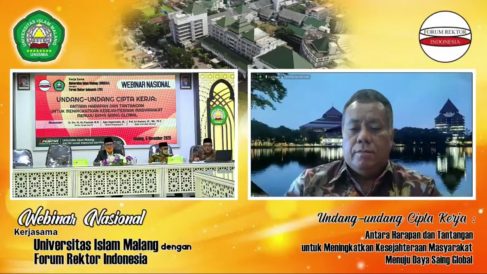Rector UI, “The Job Creation Law Between Expectations and Challenges, To Improve Community Welfare Towards Global Competitiveness”
Nino Eka Putra ~ PR of FEB UI
DEPOK – (5/11/2020)
The Rector of Universitas Indonesia, Professor Ari Kuncoro, explained that the conditions that inhibit growth in Indonesia so far are complicated regulations, convoluted permits, high investment costs, and long waiting times due to uncertainty. These issues, like the rent economy, wherein the time for obtaining permits is not clear, there are those who are willing to pay fees to cut the bureaucracy. In practice, because the bureaucracy holds a monopoly on rule-making, regulations can be customized, complicated, made to be longer to create rent, and not as a supervisory tool. These are what needs to be fixed or improved by the enactment of the Job Creation Law policy.

“With the Job Creation Law, we can grow faster to get out of the middle income country trap. A rough calculation shows that to grow in the range of 5.3 to 5.5 percent, an 8 to 9 percent investment growth is required. Based on the 2019 Global Competitiveness Report, issued by the World Economic Forum, Indonesia’s competitiveness ranking fell from position 45 to 50. However, it is still higher than the Philippines (64), Vietnam (67), India (68), and Laos (113). ), but below Malaysia (27) and Thailand (40)” Ari explained in a National Webinar organized by the Islamic University of Malang (Unisma) together with the Indonesian Chancellors Forum (FRI), on Thursday (5/11/2020) with the topic “The Job Creation Law Between Expectations and Challenges, To Improve Community Welfare Towards Global Competitiveness”.
According to Ari, the indicators of our competitiveness so far are still lacking and must be improved, namely convoluted permit issuance procedures, reflected in the time to start a business, which is ranked 103, and the cost to start a business, which is ranked 67th. Meanwhile, the health indicator ranks 96th out of 114 countries, mainly because life expectancy is in the 95th position, and the education level of the workforce, most of whom are still at the elementary level, ranks 92 for the length of schooling.
Ari continued, the good news is that the current workforce’s proficiency is still in 36th place, although the score tends to decline due to low digital skills. The labor market is under-rated because it is too rigid, so it only ranks 119th, and the fundamental weaknesses of innovation capability which ranks 74th, coupled with research and development or R&D ranks 83.
In fact, Indonesia’s potential to become a large-income country can be improved, so as not to stagnate. If that happens, we are only a market for industry because imports become faster than production. Only a few of our products can enter other countries. For investors, when conditions are not conducive to making long-term commitments, such as establishing factories, and overlapping regulations, these make them reluctant to invest. Through this law, investment opportunities are open not only for foreigners but also for us. “For example, if there is an automotive business, then UMKM can move to support it, for example by supplying the nuts and bolts. If these are fulfilled domestically, then there is no need to import,” Ari said.
“Thus, the Job Creation Law is expected to be able to prepare human resources with global competitiveness and improve welfare of the people with many new job opportunities and jobs, and reduce poverty and unemployment rates. Given, our poverty rate continues to increase, without intervention it could reach 10.63%, which is an increase of nearly 4 million people from 24 million in poverty to 28 million. With intervention, we can reduce it to 9.7% – 10.2% or 2 million. In 2020, the unemployment rate will increase by 4 million – 5.5 million. If the pandemic continues, it is feared that in 2021 the unemployment rate will reach 10.7 million – 12.7 million, ” Ari concluded his session. (hjtp)
(am)





